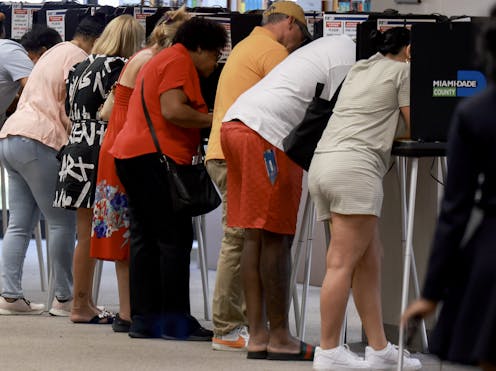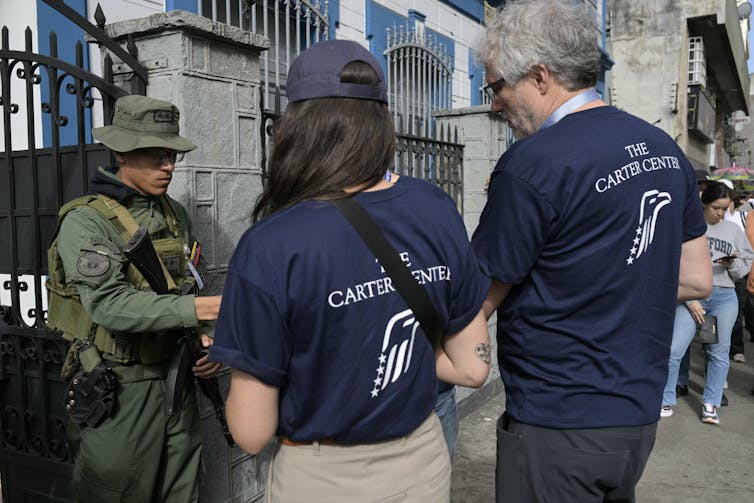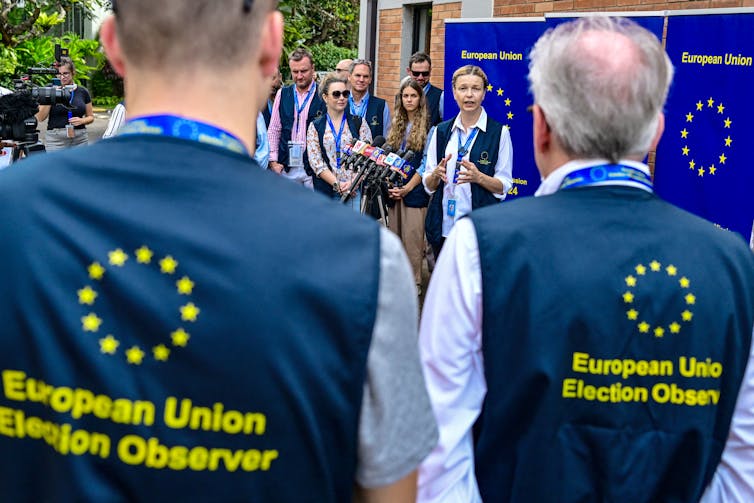International election monitors can help boost people’s trust in the electoral process − but not all work the same way
- Written by Sarah Bush, Associate Professor, Political Science, University of Pennsylvania
 People fill out their ballots during the early voting period in Cutler Bay, Fla., on Oct. 27, 2024. Joe Raedle/Getty Images
People fill out their ballots during the early voting period in Cutler Bay, Fla., on Oct. 27, 2024. Joe Raedle/Getty Images U.S. elections are free, fair and secure, research shows – but about 20% of Americans still said in a September 2024 Gallup survey that they are “not at all confident” that the presidential election results will be accurate.
Faith has been declining in the integrity of U.S. elections in recent years, and the Jan. 6, 2021, Capitol insurrection revealed how deadly and dangerous this mistrust can be.
Most countries in the world, from Bolivia to Sierra Leone, invite independent international election monitors – people who visit polling sites and monitor the technologies voters use to cast their ballots – to promote election integrity and public confidence in elections.
Although the U.S. government supports nonpartisan election monitors in other countries, this practice has a low profile in U.S. elections and varies in its prevalence across the states.
A team of 79 independent international election observers began monitoring the election process across the U.S. on Oct. 5, 2024. This group is trained by the Organization for Security and Co-operation in Europe, or the OSCE, an international organization that promotes peace and democracy and does election monitoring in other countries. The U.S. invited this group in March 2024 to observe the presidential election. The U.S. government regularly sends out election monitors across the country.
There are also thousands of anticipated partisan observers affiliated with both the Republican and Democratic parties who will be at polling places monitoring the balloting and counting of the votes. Nonpartisan observers who are receiving support and training from well-known nonprofit groups that try to advance democracy globally, like the Carter Center, will also monitor the vote in New Mexico.
We are scholars of democracy, elections and public opinion. The U.S. could likely benefit in terms of public confidence from giving greater access and paying more attention to credible, nonpartisan election monitors who observe what happens before, on and after Election Day.
Research shows that election monitoring can help make elections more democratic and boost people’s trust in the process.
 International election observers from The Carter Center present their credentials to a soldier standing guard outside of a polling station in Caracas, Venezuela, during the presidential election on July 28, 2024.Yuri Cortez/AFP via Getty Images
International election observers from The Carter Center present their credentials to a soldier standing guard outside of a polling station in Caracas, Venezuela, during the presidential election on July 28, 2024.Yuri Cortez/AFP via Getty ImagesWhat election monitors do
Election monitoring most often involves independent and impartial people observing elections. Sometimes, these observers come from other countries and are part of international organizations such as the European Union, as well as nongovernmental groups like the Carter Center.
Credible foreign observers have the common goal of assessing whether an election is conducted fairly, transparently and in line with international standards for democratic elections. People can also observe elections within their own countries, according to related standards.
Observers might check to see whether polling stations open and close on time on Election Day and whether eligible voters are casting their ballots freely and without intimidation. They can also track and publicize any inability to gather information. Their influence comes from their reputations as quality sources of information on election integrity.
During the October 2024 presidential election in Mozambique, for example, European Union election observers were critical of some parts of the process, because they “were prevented to observe tabulation processes in some districts and provinces.”
Governments in countries where an election is taking place generally invite international election monitors to observe. In other cases, countries are members of international organizations, such as the OSCE, whose members are expected to invite observers to their elections.
Nearly every country in the world has invited international election observers to its national elections at least once.
About 80% of national elections in countries including Bangladesh, Moldova, Nigeria and Ghana have had international election monitors present in recent years.
Well-trained international monitors observe the entirety of a country’s election cycle – not just on Election Day.
Before an election, monitors assess the political and media environment and gather information about voter registration and campaigning. On Election Day, they visit polling stations to ensure that voters are not being intimidated and the voting technology is working appropriately. In some countries, voting may occur over multiple days or even weeks. After the election, observers oversee the counting of ballots and resolution of election disputes.
Finally, they issue reports that detail their assessments about an election’s integrity and make suggestions about how election quality can be improved in the future.
Election monitoring usually strengthens democracy
High-quality election monitoring improves the quality of elections and ultimately strengthens democracy.
First, election monitors can help deter fraud. Would-be cheaters do not want to be caught by monitors if they try to inflate vote counts. When international observers were present at polling stations in Armenia during the country’s 2003 presidential election, they were estimated to reduce fraud by about 6%.
Second, when independent election monitors uncover evidence of wrongdoing, such as improper vote-counting procedures, they publicize it. This public attention can reach domestic and international audiences and generally leads to more accountability during and after an election.
International monitors criticized the election process in Serbia and Georgia in 2003. This attention helped the public mobilize and protest the flawed elections, ultimately leading to the ousting of dictators in Serbia and Georgia.
Monitors can also reassure the public that elections are genuinely democratic. We conducted survey research in Tunisia following the country’s 2011 revolution. The country’s first democratic elections that same year could have been mired in uncertainty given a long history of authoritarianism.
We found that international election observers’ presence and reports contributed to Tunisians’ beliefs that the elections were democratic, although the effects were dependent on the identity of the observers as well as the party identification of the Tunisian voter.
Election monitoring’s potential pitfalls
Still, election monitoring has a few downsides.
Protests about flawed elections might lead to government repression and violence against protesters, as happened in Kenya in 2007.
Second, even high-quality election monitors have their biases. Sometimes, they are less critical of flawed elections when they are worried about election violence or for other reasons.
Finally, some authoritarian regimes – especially those connected with Russia – have increasingly invited sham observers who endorse flawed elections. This helps dictators create a façade of legitimacy for their elections.
 Members of the European Union’s Election Observation Mission speak ahead of the presidential election in Colombo, Sri Lanka, in September 2024.Ishara S. Kodikara/AFP via Getty Images
Members of the European Union’s Election Observation Mission speak ahead of the presidential election in Colombo, Sri Lanka, in September 2024.Ishara S. Kodikara/AFP via Getty ImagesLessons for the US
Since the early 2000s, the U.S. has hosted international observers like the ones now observing the election who are part of – and trained by – the Organization for Security and Cooperation in Europe. The U.S. is a member of this group.
The OSCE observers have generally been complimentary about the democratic character of U.S. elections, although they also suggest areas for improvement. Their 2020 report issued immediately after the November presidential election was “pointed” in its criticism of Trump’s efforts to undermine trust in the election.
U.S.-based groups such as the League of Women Voters also train nonpartisan election monitors.
State laws vary greatly on whether and how observers can even monitor elections. Sixteen states, including North Carolina and Pennsylvania, officially authorized only partisan poll watchers as of 2016 – although they may have unofficially allowed nonpartisan groups to observe.
Indeed, partisan poll watchers are more often seen at U.S. elections, and their presence may have mixed effects on voter confidence.
Some states that don’t allow nonpartisan election observers are missing a key opportunity to enhance transparency and accountability through a mechanism that has been proven globally to promote electoral reform. Just as important, Americans in many states are missing the chance to hear from the nonpartisan groups that are most likely to reassure them about election quality.
Sarah Bush receives funding from Public Agenda and States United Democracy Center.
Lauren Prather receives funding from Public Agenda and States United Democracy Center.
Authors: Sarah Bush, Associate Professor, Political Science, University of Pennsylvania

